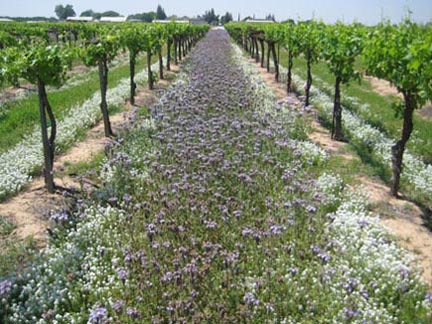Summary
Investigator: Miguel Altieri, University of California, Berkeley, CA
Project location: Sonoma and Napa counties, California
This project is aimed at assessing the impact of four flowering inter-crop species on the enhancement of biological control of multiple insect pests of wine grapes in several Napa and Sonoma County vineyards. This second year we have included four additional  growers for a total of 10 in whose vineyards we will establish agroecologically diversified blocks which will be compared to adjacent blocks under normal management.
growers for a total of 10 in whose vineyards we will establish agroecologically diversified blocks which will be compared to adjacent blocks under normal management.
Project objectives are:
Continue testing hypotheses of conservation biological control by measuring the efficacy of a novel spatial/temporal sequence of four flowering intercrop species (annual buckwheat, lacy phacelia, sweet alyssum and wild carrot) on the enhancement of biological control of specific arthropod pests (western grape leafhopper, Pseudococcus mealybugs and spider mites) which will provide floral resources to natural enemies during the entire growing season;
Generate new and relevant information that will serve as a basis for the development of practical and cost-effective ecologically-based pest management strategies for certified organic production in wine grapes.
In addition to a scientific evaluation of impacts of agroecological treatment on pest densities and crop damage, the project will make comparative cost-benefit analyses of floral resource provisioning and conventional farming practices, thus helping participating growers evaluate the cost-effectiveness of the tested practices.
